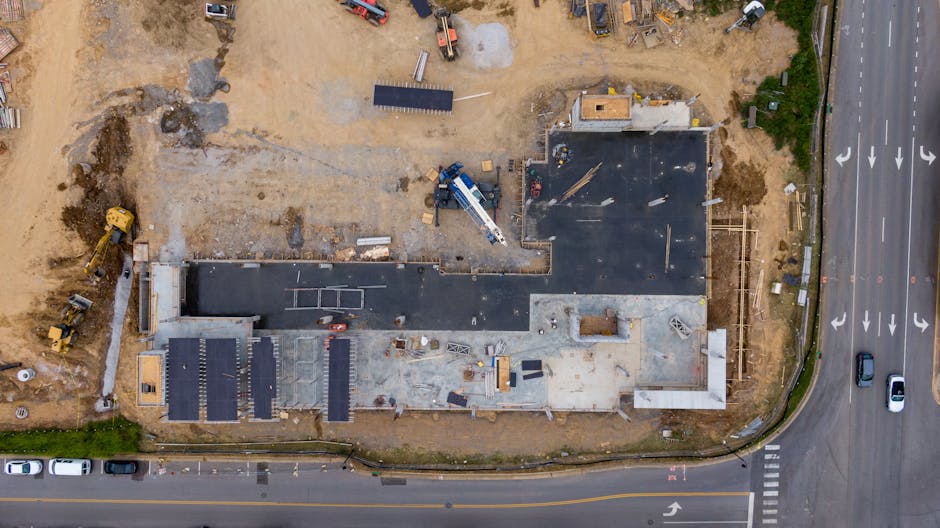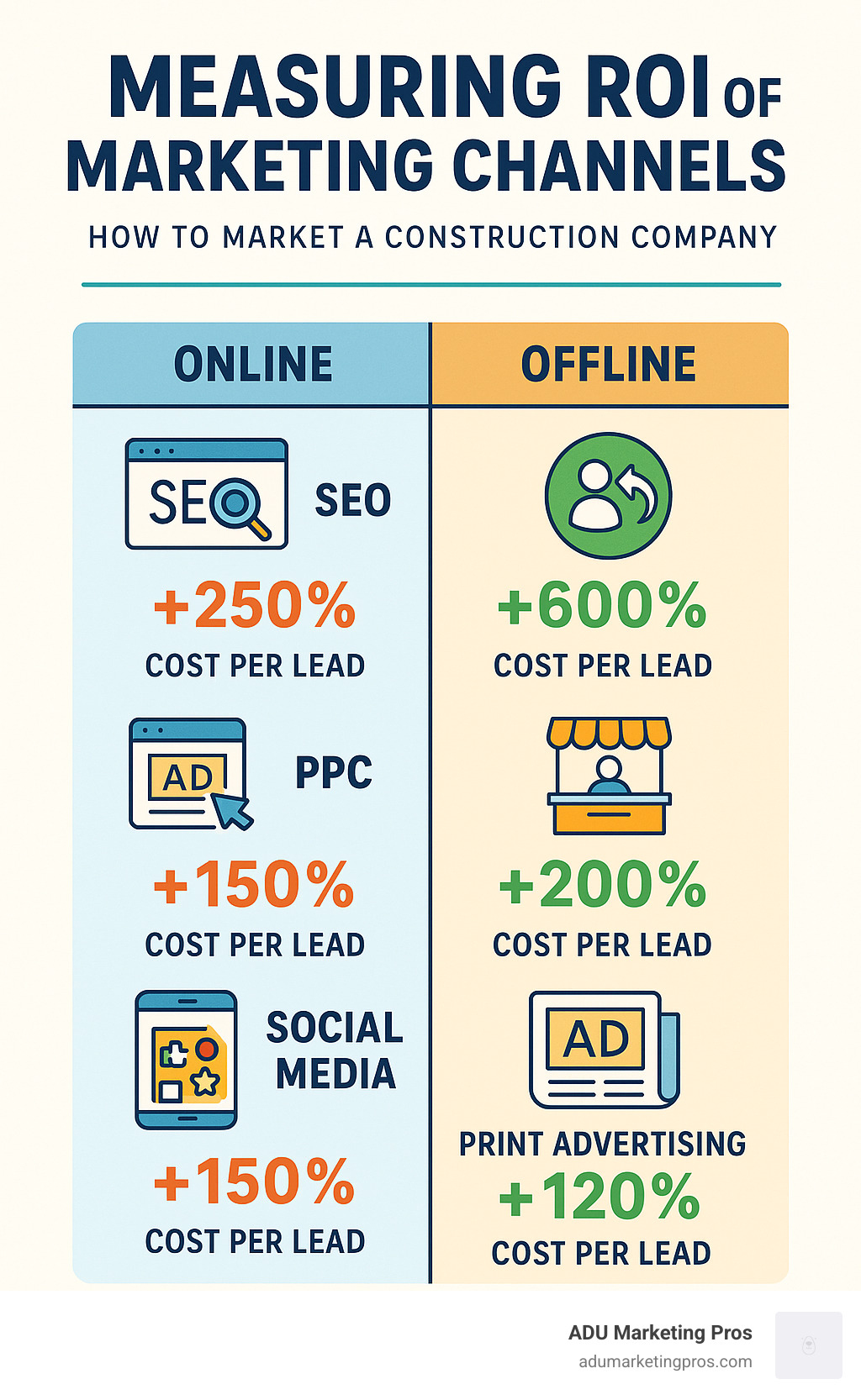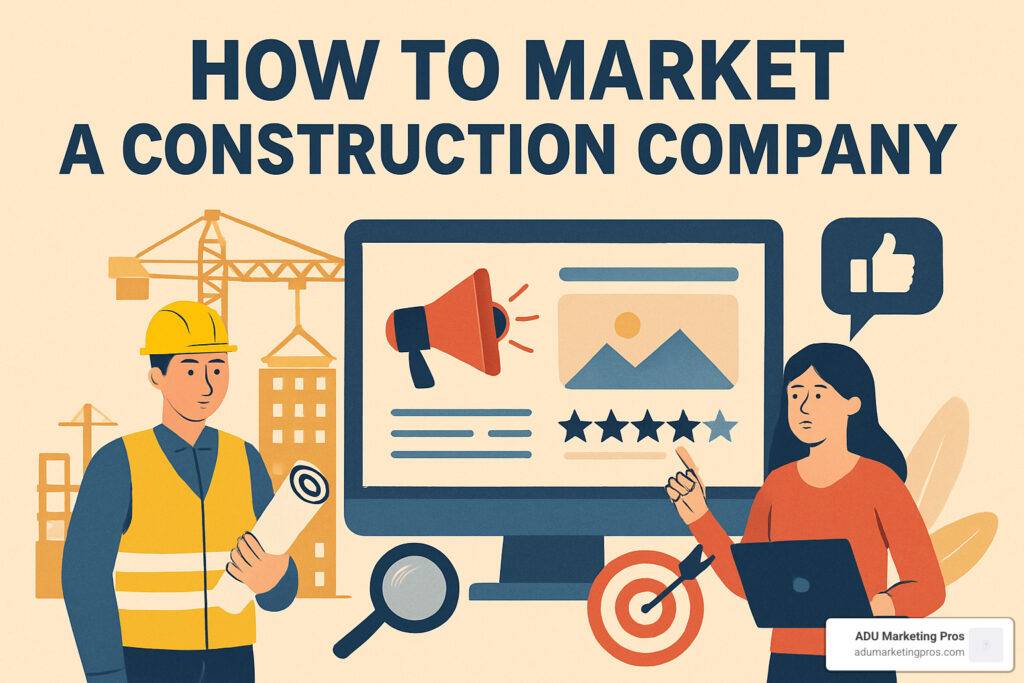Why Marketing Your Construction Company is More Critical Than Ever
How to market construction company effectively starts with understanding that 81% of consumers go online to research local companies before making decisions, and 56% of consumers don’t trust businesses without a website. The construction industry is experiencing a massive digital shift that’s leaving many contractors behind.
Quick Answer: Essential Construction Marketing Methods:
- Build a professional, mobile-responsive website with project galleries and clear contact information
- Claim and optimize your Google Business Profile for local search visibility
- Implement local SEO strategies using location-based keywords and service area pages
- Generate and showcase customer reviews – 90% of consumers read them before engaging
- Create video content showing project progress and completed work
- Run targeted Google Local Services Ads to appear at the top of search results
- Develop referral programs to leverage word-of-mouth marketing
- Maintain consistent branding across all jobsite signage and vehicles
The landscape has changed dramatically. While word-of-mouth remains important, 63% of customers now primarily use a contractor’s website to find and engage with construction companies. Even more telling: 30% of consumers won’t even consider a business without a website.
Only 15% of construction companies have implemented a digital change strategy, creating a massive opportunity for those willing to adapt. The firms investing in marketing – typically 6-12% of revenue – are consistently outperforming competitors who rely solely on traditional methods.

Crafting Your Construction Marketing Blueprint
Think of marketing your construction company like planning any major project. You wouldn’t break ground without blueprints, permits, and a clear timeline. The same principle applies when figuring out how to market construction company services effectively.
The most successful construction firms approach marketing strategically, understanding that good marketing creates predictable lead flow and sustainable growth.
Defining Your Ideal Client Profile
The biggest mistake contractors make is trying to market to everyone. The most profitable approach? Get laser-focused on your ideal clients.
Start by analyzing your most profitable past projects. What made those clients great to work with? This detective work will save you thousands in wasted marketing dollars.
For residential clients, consider their income level and neighborhood, age range and family status, property type and value, plus timeline flexibility. For commercial clients, analyze company size and industry, project budget ranges, decision-making process, and repeat project potential.
Most importantly, understand their pain points. Are they worried about budget uncertainty, timeline delays, quality concerns, or permit challenges? When you understand what keeps them up at night, you can position yourself as the solution.
Setting Goals & Budget Allocation
The U.S. Small Business Administration recommends construction companies spend 7-11% of revenue on marketing. New firms might invest 12-20% initially, while established companies typically stick to 6-12%.
Here’s the mindset shift: marketing is an investment, not an expense. When done right, every dollar should return three dollars or more.
Track your cost per lead (should be 2-5% of average project value), lead-to-customer conversion rate (aim for 15-25%), and return on marketing investment (target at least 3:1).
Building the Tactical Roadmap
Your marketing roadmap needs logical sequencing. Phase 1 focuses on foundation – website, Google Business Profile, basic local SEO, and review generation (months 1-3). Phase 2 builds content and visibility – blog, social media, video content, and email marketing (months 4-6). Phase 3 accelerates growth – paid advertising, advanced SEO, partnerships, and automation (months 7-12).
Scientific research on marketing plans shows that companies with documented marketing plans are 313% more likely to report success.
Dominating the Digital Jobsite — how to market construction company Online
Your digital presence is your new storefront, open 24/7. With 75% of construction companies now promoting their businesses on social media, the question isn’t whether you should be online – it’s whether you’re doing it right.

Your website is your hardest-working employee, showcasing your best work around the clock. It needs a solid content management system (CMS) like WordPress, smooth user experience, SSL certificates for security, fast loading speeds, and mobile responsiveness.
SEO Essentials: how to market construction company for Search Visibility
Search engine optimization is like having the best location in town – except it’s digital real estate. Local SEO is your secret weapon because 46% of all Google searches include location terms.
Focus on keyword clusters that make sense for your business. Instead of fighting for impossible terms like “construction company,” target specific, location-based searches like “bathroom remodeling [your city]” or “emergency roof repair near me.”
Your on-page optimization needs to be spot-on. Every page should have clear title tags, compelling meta descriptions, and proper header structure. Don’t forget image alt text – search engines can’t see your project photos unless you describe them.
Your blog strategy should answer real customer questions. Turn job site conversations into helpful articles. “How long does a kitchen remodel take?” or “What permits do I need for a deck addition?” are pure gold for SEO.
Building quality backlinks takes time but pays off. Partner with local suppliers, join your chamber of commerce, and contribute to industry publications.
More info about ADU Digital Marketing Strategies offers specialized insights for contractors in the rapidly growing ADU market.
Social, PPC & Email: how to market construction company Across Channels
Smart contractors don’t put all their eggs in one marketing basket. Multi-channel marketing meets customers wherever they are in their decision-making journey.
Google Ads and Local Services Ads are game-changers. Local Services Ads appear at the very top of search results, and you only pay when someone actually contacts you.
Each social media platform serves a different purpose. Facebook works beautifully for residential contractors, LinkedIn is essential for commercial clients, and Instagram showcases visual work to younger demographics.
Email marketing delivers 122% ROI when done right. The key is segmentation – past customers get different messages than current prospects.
Scientific research on Google Business Profile shows that complete profiles are twice as likely to be considered reputable by consumers.
Engaging Content & Video that Converts
Video content leads to a 157% increase in organic search traffic. For construction companies, video is perfect because your work is naturally visual and dramatic.
Time-lapse videos are social media gold. Watching a kitchen transform from demolition to completion in 90 seconds never gets old.

Drone footage adds a professional edge that sets you apart from competitors. Client testimonials on video carry more weight than written reviews. Educational content positions you as the expert – create short videos explaining common problems or walking through your process.
Cementing Local Presence & Reputation
Your local reputation is everything in construction. 90% of consumers read online reviews before engaging with a business. Your online reputation isn’t just nice to have – it’s essential for staying competitive when learning how to market construction company effectively.

Winning the Local 3-Pack
When someone searches for “contractors near me,” Google shows three local businesses at the top. Landing here is like having a prime billboard on the busiest street in town.
Getting into that top three spot starts with NAP consistency – Name, Address, and Phone number must be identical everywhere online. Check your Google Business Profile, website, social media, and directories.
Service area pages are another game-changer. Create dedicated pages for each city you serve. “Kitchen Remodeling in Downtown Springfield” will always outrank a generic page for local searches.
Review Generation & Management
Most satisfied customers are happy to leave reviews if you make it easy. The perfect timing is right after project completion when customers are thrilled with their new space.
While Google Business Profile reviews are most important, encourage reviews on Yelp, Angie’s List, and Better Business Bureau too.
Respond to every review within 24 hours – both positive and negative. Future customers watch how you handle feedback.
Video testimonials take this to the next level. When you finish a project and the customer is thrilled, ask to film a quick 60-90 second testimonial on site.
Community & Partnerships
Strong community connections establish your reputation as a trusted local business. Join the National Association of Home Builders (NAHB), local builder associations, and Chamber of Commerce – then actually show up and participate.
Supplier partnerships create win-win opportunities. Work with local suppliers on joint advertising campaigns or referral programs.
Get involved through sponsoring local sports teams, volunteering for Habitat for Humanity, or hosting educational workshops. These activities position you as a helpful expert, not just another contractor trying to sell something.
From Hard Hats to Handshakes: Offline & Relationship Tactics
While everyone’s talking about digital marketing, how to market construction company success still depends heavily on face-to-face connections. Your physical presence often creates that crucial first impression before customers visit your website.

Networking & Industry Associations
Construction remains a relationship-driven business where who you know often matters as much as what you know.
Chamber of Commerce membership opens doors to local business networks. Building Industry Association (BIA) events connect you with professionals who can become valuable referral sources.
The key to successful networking isn’t collecting business cards – it’s building genuine relationships. Focus on learning about others’ businesses and challenges.
Speaking opportunities position you as an industry expert. Volunteer to present at association meetings about new techniques or project management strategies.
Referral & Repeat Business Programs
Your past customers represent your most valuable marketing asset. Referral incentive programs turn satisfied customers into active promoters – consider offering finder’s fees or gift certificates for successful referrals.
Milestone check-ins keep you connected with past customers. Call them 30 days after project completion and send seasonal maintenance reminders.
Print & On-Site Branding
Your jobsite serves as daily advertisement to everyone who passes by. Jobsite professionalism starts with organization and cleanliness – a well-organized site signals quality workmanship.
Yard signs remain cost-effective marketing tools. Include QR codes linking to your project gallery. Vehicle wraps transform trucks into mobile billboards. Branded safety gear keeps crews safe while reinforcing your professional image.
Physical and digital marketing work best when integrated. Use consistent branding across business cards, vehicle wraps, and yard signs to reinforce your professional image at every touchpoint.
Measuring, Optimizing & Answering Your Questions
Marketing without measurement is just spending money. Track key performance indicators to understand what’s working and optimize your investment.

Essential KPIs to Track:
– Website traffic and source attribution
– Lead generation by channel
– Cost per lead by marketing method
– Lead-to-customer conversion rates
– Customer lifetime value
– Return on marketing investment
Tools for Tracking Success:
– Google Analytics for website performance
– Call tracking numbers for phone leads
– CRM systems for lead management
– Social media analytics for engagement
Frequently Asked Questions about Construction Marketing
Why is a professional website non-negotiable?
56% of consumers don’t trust businesses without a website, and 63% of customers primarily use a contractor’s website to find and engage with them. Your website serves as your digital office, working 24/7 to attract and convert leads.
A professional website should include clear service descriptions, project portfolio with before/after photos, customer testimonials, easy contact forms, mobile-responsive design, fast loading speeds, and local SEO optimization.
How much should a construction company spend on marketing?
Construction companies should typically invest 6-12% of revenue in marketing, with new businesses potentially spending 12-20% initially. This investment should generate 3:1 returns or better.
Budget allocation recommendations: 40% Digital marketing, 25% Local advertising, 20% Networking, 15% Print materials and signage.
Which digital channel drives the fastest leads?
Google Local Services Ads typically generate the fastest results, often producing leads within days. You only pay when customers contact you directly, and the “Google Guaranteed” badge builds immediate trust.
However, the most effective approach combines multiple channels: Local Services Ads for immediate visibility, SEO for long-term growth, social media for brand awareness, and email marketing for lead nurturing.
Conclusion
Learning how to market construction company successfully isn’t just about choosing the right tactics – it’s about building a system that grows with your business. The construction companies winning today understand that marketing isn’t separate from their operations; it’s woven into everything they do.
Don’t try to master everything overnight. Pick two or three strategies that align with your goals and execute them really well. Once those are working, add the next piece.
The future of construction marketing is exciting for companies willing to accept change. AI tools are making it easier to personalize customer experiences. Video content continues growing in importance. Local SEO is becoming even more critical as people search on their phones.
For companies in specialized markets like ADU construction, the opportunities are particularly promising. The ADU sector is experiencing explosive growth, especially in California markets like Los Angeles, San Diego, and the San Francisco Bay Area.
The key is patience combined with consistency. SEO takes months to show results, but it keeps working for years. Email marketing builds slowly but delivers incredible ROI over time. Referral programs compound as your satisfied customer base grows.
More info about ADU Marketing Solutions can help specialized construction firms steer this growing market effectively.
At ADU Marketing Pros, we’ve seen how the right marketing approach transforms construction businesses. Our specialized focus on ADU construction and architecture firms means we understand the regulatory complexities, customer education needed, and competitive landscape you’re facing.
Whether you’re a general contractor looking to expand into ADUs or an architecture firm specializing in accessory dwelling units, the marketing principles remain the same: be helpful, be consistent, and be patient. The contractors who commit to strategic marketing today will be the ones dominating their markets five years from now.
Start building your marketing foundation today, one satisfied customer and one helpful piece of content at a time. The compound effect of consistent marketing effort separates thriving construction companies from those just getting by.

